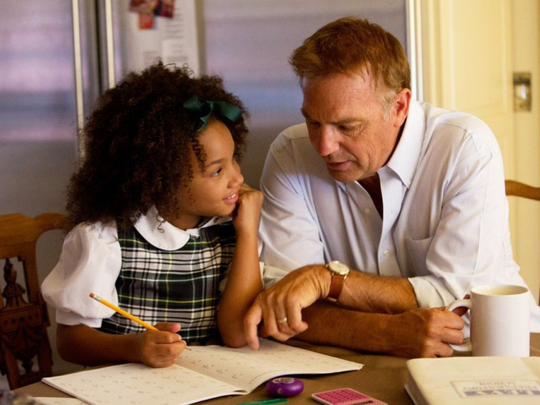
Near the end of Black or White, Mike Binder’s excruciating new movie about race, a bitter battle over the custody of a young girl named Eloise Anderson (Jillian Estell) reaches its courtroom climax.
Eloise, who is of Caucasian and African-American heritage, has been living with her grandmother Carol (Jennifer Ehle) and grandfather Elliot (Kevin Costner), because her mother died at her birth, and her father, Reggie (Andre Holland), struggles with drug addiction.
But when Carol dies, leaving the alcoholic Elliot as Eloise’s sole guardian, Eloise’s other grandmother, Rowena (Octavia Spencer), mounts a bid for full custody. Rowena’s campaign requires Reggie to testify that he has been deprived the parental rights he badly wanted to exert.
To try to prove that Reggie is a liar, Elliot’s lawyers ask Reggie to spell his daughter’s name. Since much of Black or White is concerned with the supposed difference between respectable black people and shiftless ones, when Reggie comes up with “Loeze,” the scene is meant to communicate both that Reggie doesn’t know his daughter and that he’s a negative stereotype made flesh.
Among the problems with Black or White is that the movie cares precisely as little about Eloise as Reggie supposedly does. What’s supposed to be a movie about what’s best for Eloise is an opportunity for the adult characters to preen about their righteousness and learn supposedly important lessons.
“You need to comb out my hair,” Eloise tells Elliot toward the beginning of the movie, in one of the many signs (in addition to his alcoholism) that Elliot is perhaps not perfectly prepared to parent this particular girl. “Not from the top down, from the bottom up.” That scene is one of the last instances in which Black or White shows any particular concern toward Eloise’s needs, much less to her inner life.
When Elliot hires Duvan (Mpho Koaho), an African immigrant, to tutor Eloise in math, Rowena is sceptical. “Got a little black math tutor, that’s going to do it?” she demands of Elliot. “Take care of that whole half of her soul?”
But Black or White never really answers that question by exploring Eloise’s relationship with her tutor. Instead, the movie spends more time showing Duvan being bewildered by Eloise’s African-American relatives in much the same way Elliot often is. Duvan is just another device for Black or White to set up a distinction between good black people and bad ones, as if those are actual categories that exist and not products of a racist imagination.
Similarly, Black or White shows little interest in what Reggie’s absence has meant to Eloise. At one point, Rowena actually suggests that Reggie should continue the fight for custody because it’s good for him. “She needs to be in your life, baby, making you whole,” Rowena coos. “That’s why you’re so sick.” Later, Reggie is inspired to save Elliot from drowning when he drunkenly falls into his swimming pool after seeing a drawing that Eloise made of Reggie and Elliot together.
Eloise is just as much a device to Black and White as she is to the two sets of adults competing to care for her.
There are plenty of other nasty streaks running through Black or White. Binder trots out the stalest chestnuts from discussions of race past. Rowena’s brother Jeremiah (Anthony Mackie) is a hustler of a lawyer who insists on making the custody fight racial, telling Rowena, “Do you want what’s best for the child? Then he has a problem with black people.” Also: A white guy argues that he should be excused from using a racial epithet in anger because the object of his rage also used the word colloquially in text messages.
This is a movie that posits that every confrontation a white man makes with his own racism must be paired with an equal and opposite concession by his African-American interlocutors. After Elliot uses that epithet to refer to Reggie, as well as saying a number of other ugly things about him, Reggie actually admits on the stand in court that “the things that Mr Anderson said about me last week were hard to hear, but they were true.”
It says something that even with these other rotten elements of the movie looming large, the disregard that Black or White shows for Eloise is still shocking. “Why do you always have to go there?” Elliot petulantly asks Rowena when they’re talking about Eloise’s heritage. “Why do you always have to pretend there’s no there to go to?” Rowena fires back at him.
It might have been a powerful exchange if Black or White had any idea at all where “there” was on the map of the American racial conversation.








